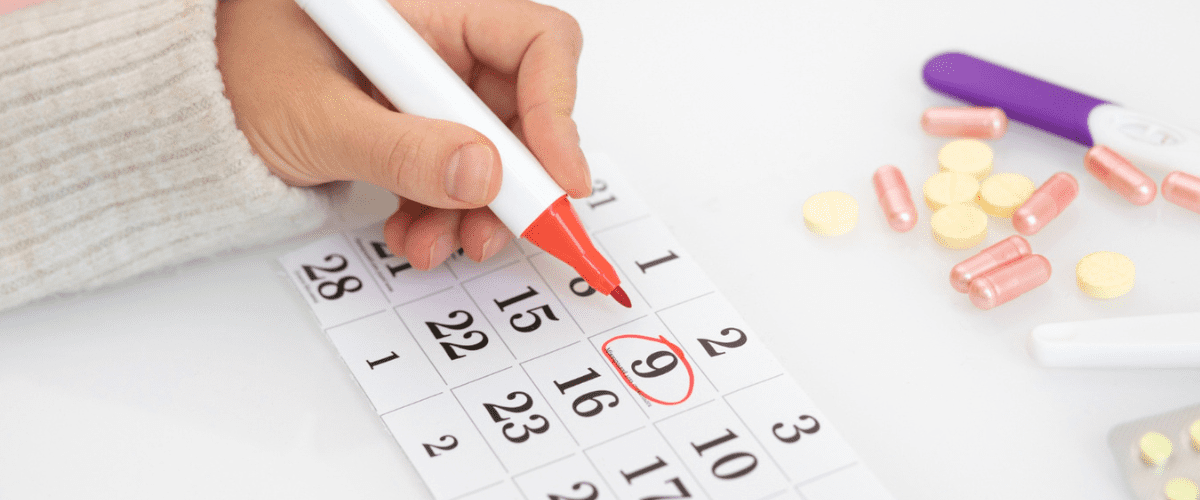
15 May Why is My Period Late? 10 Reasons & When to Worry
Why is My Period Late? 10 Reasons & When to Worry
By Island Hospital | May 15, 2024 12:00:00 PM
We may experience late periods every once-in-awhile, spanning from a few weeks to months. During these delays, questions such as “Why is this happening?” and “When should I start worrying?” may arise.
This article provides an in-depth understanding of these topics. We discuss the possible reasons for late periods, when to seek medical help, impact of irregular periods, and treatments to get your period back.
How Much Delay is Normal in Periods?
Generally, women (who have not reached menopause) have a cycle of approximately 28 days.
However, some women may experience shorter or longer cycles, as a healthy menstrual cycle ranges from every 21 to 35 days.
Irregularity can also refer to the frequency, duration, ‘intensity’ of menstrual flow, and the level of pain.
While a period late by a few days is usually no cause for concern, persistent delays might be the sign of an underlying health condition. We will elaborate further on this in the following section.
So, When to Worry?
We advise consulting your healthcare provider or scheduling health checkups in the following situations:
- (For individuals with very regular periods) Period is late for more than 3 days.
- Period is late 3 times in a row.
- Periods have not started at age 16.
- Period is late and you experience symptoms such as weight changes, fatigue, headaches, fevers, vision changes, and hair growth on face.
10 Reasons For a Delayed Period
Here are a few common reasons for a late period.
1. Stress
Physical or emotional stress can disrupt your body’s hormone levels – where the production of the gonadotrophin releasing hormone (GnRH) is interrupted.This is the hormone responsible for regulating ovulation and the menstrual cycle.
Generally, everyday stress will not affect your period. However, very stressful events such as high-stakes exams, grief over a death, and work-related stress could lead to delayed periods.
Your regular cycle may return once the stressful situation ends, or once you start practising effective stress-coping strategies.
If you are unsure where to start, consult a licensed counsellor or therapist for helpful advice on reducing stress levels.
2. Weight-Related
A significant weight gain or loss can cause hormonal imbalances, leading to irregular menstrual cycles. The following weight-related conditions will also affect your period:
a) Obesity
Obesity affects the regulation of oestrogen and progesterone, therefore inhibiting the menstrual cycle. In fact, a 2022 study found that obese adolescents are more likely to have irregular menstrual cycles than normal weight adolescents. Weight loss can help regulate the menstrual cycle in such cases.
b) Underweight
An underweight body has insufficient fat and other necessary nutrients. This hinders the individual’s ability to produce hormones normally, therefore affecting the menstrual cycle. Weight gain can help regulate the menstrual cycle in these cases.
c) Eating disorders
Eating disorders, like anorexia, can lead to hormonal imbalances and irregular or absent periods. Your body may also perceive this as a ‘stressful’ situation for the body – further impacting your period. Treatment and recovery to return to a healthy weight will help regulate the menstrual cycle in such cases.
How to Seek Help
If you suspect you or a loved one has an eating disorder:
- Talk to trusted family and friends, and seek medical help.
- Reach out to the Malaysian Mental Health Association (MMHA) Helpline.
- Consult your healthcare provider.
3. Excessive Exercise
Excessive exercise can lead to delayed or absent periods. You may face this issue if you are performing intense workouts. Individuals who suddenly start a vigorous workout routine may also face this issue.
In this case, irregular periods happen because your body does not have sufficient energy to keep all bodily systems running – causing you to stop ovulating and experience amenorrhea (no menstruation).
To combat this, you should maintain a healthy and balanced diet, consume more calories and nutrients, and exercise moderately. Consult a sports doctor for a meal and workout plan to suit your unique needs.
4. Polycystic ovary syndrome (PCOS)
Women with polycystic ovary syndrome (PCOS) have a hormonal imbalance that can cause irregular periods.
More specifically, PCOS causes multiple small cysts to develop in the ovary. These follicle’s are unable to grow to a size that will trigger ovulation.
Therefore, there is an imbalance in the levels of oestrogen, progesterone, LH, and follicle-stimulating hormone (FSH) – leading to delays in the menstrual cycle.
Besides irregular periods, symptoms of PCOS include:
- Weight gain
- Infertility
- Oily skin and acne
- Hair loss on the head
- Hair growth on the face or body
Treatments for this condition include oral contraceptives and metformin. Women with PCOS are also advised to maintain a balanced diet, exercise regularly, and have regular health screenings.
5. Birth control
Hormonal birth control may cause periods to become irregular or stop entirely. These methods introduce synthetic hormones into the body, affecting the natural hormonal balance and menstrual cycle.
When you start or stop taking a new type of contraceptive, your body starts to adjust to the hormonal changes.
In this ‘new menstrual cycle’, the maintenance and shedding of the uterine wall is controlled by the hormones in the pill, injection, or patches.
Do note that certain contraception may even cause periods to stop. For instance, the progestogen-only pill, contraceptive injection, and intrauterine system (IUS).
However, your periods will return once these birth control methods are no longer used.
It’s important to note that the effects of pills vary among people and may have unpredictable side effects.
6. Chronic diseases
Chronic conditions that can impact your menstrual cycle. For instance, celiac disease can significantly affect women’s health. It can cause amenorrhea, menstrual irregularities, infertility, negative pregnancy outcomes, and more.
Besides, women with type 1 diabetes are more prone to having irregular periods. However, there is some evidence that suggests this issue may reduce with age – with participants of the study no longer exhibiting distinct symptoms after age 30.
Moreover, while the disease itself may not affect the menstrual cycle, the medication can lead to irregularities. For example, anti-psychotics, antidepressants, chemotherapies, and thyroid medications can cause irregular or absent periods.
7. Perimenopause
Perimenopause is the transitional stage after the age of 40, in which menopause is developing. At this time, your periods may become increasingly irregular and start to lessen.
Perimenopause usually lasts 3 to 4 years. Some women may experience a sudden end to their periods, while others may face irregular periods for years.
Besides irregular periods, the symptoms of perimenopause include:
- Hot flashes
- Heavy periods
- Night sweats
- Vaginal dryness
- Uterine bleeding problems
- Difficulty sleeping
- Mood-related symptoms (depression, anxiety, irritability)
The treatments for perimenopause are primarily to treat the symptoms. These treatments include progestin, low-dose birth control pills, antidepressants, vaginal oestrogen, and more.
8. Primary ovarian insufficiency (POI)
Primary ovarian insufficiency (POI) occurs when a woman’s ovaries stop working normally before age 40.
Women with POI may have irregular periods and reduced fertility before 40, and this condition could start when they’re still teenagers.
However, unlike premature menopause, they may still have occasional periods and could get pregnant.
Besides irregular periods, the symptoms of POI include:
- Hot flashes
- Night sweats
- Irritability
- Poor concentration
- Decreased sex drive
- Pain during sex
- Vaginal dryness
The treatments for POI are primarily to treat the symptoms, lower related health risks, and treat POI-caused conditions. These treatments include hormone replacement therapy (HRT), calcium and vitamin D supplements, regular exercise, and more.
9. Thyroid issues
Thyroid disease includes hyperthyroidism (too much thyroid hormone), and hypothyroidism (too little thyroid hormone).
This hormone plays a role in regulating the menstrual cycle. Without the right level of thyroid hormone, your periods may become irregular or stop altogether.
Besides irregular periods, symptoms of thyroid diseases include:
- Fatigue
- Intolerance to cold
- Constipation
- Weight gain
- Brittle nails
- Depression
- Infertility
Treatment for thyroid issues include medication such as levothyroxine and liothyronine. Women with this disease may also need to undergo lifestyle changes and receive regular monitoring by a healthcare provider.
Did you know thyroid diseases are one of the common health issues faced by women? Learn more in our article on Women’s Health Issues.
10. Pregnancy
A pregnancy can cause a late period. Your body produces hormones that stop ovulation and the shedding of your uterus lining, when conception has happened.
Therefore, your period will stop, and only return after you have given birth.
Besides irregular periods, here are a few more symptoms of pregnancy:
- Morning sickness (feeling sick)
- Fatigue
- Sore and swollen breasts
- Peeing more frequently
- Unusual cravings
- Metallic taste in mouth
- Spotting (implantation bleeding)
A pregnancy test is the best way to find out if you are really pregnant. Positive home pregnancy tests are most probably correct, while negative tests are less reliable.
Be sure to follow the test instructions closely, and test again if you are unsure of the results.
Impacts of Irregular Periods
Irregular periods are crucial health markers for women. This is because they may be symptoms of or connected to a larger health issue.
For example, irregular menstrual cycles are associated with various diseases including metabolic syndrome, coronary heart disease, Type 2 Diabetes Mellitus, and Rheumatoid Arthritis.
They have also been linked to issues like anaemia, osteoporosis, psychological problems, decreased quality of life, and infertility.
Furthermore, irregular periods raise the risk of developing pregnancy-related hypertensive disorders. Women with irregular periods may also experience complications with childbirth and newborns.
Therefore, it’s vital to seek medical help if you notice abnormalities in your menstrual cycle.
How Do I Get My Period Back?
The treatment is based on the underlying health issue. To summarise, here are a few treatments to return to a regular menstrual cycle:
Medications
-
- Helps you to regulate your menstrual cycle, relieve symptoms, and control heavy bleeding.
- Examples: Hormonal birth control, pain relievers, hormone therapy, etc.
Surgery
-
- Removes or destroys tissue and other parts of the uterine which are causing irregular or excessive bleeding.
- Examples: Endometrial ablation, myomectomy, hysterectomy, etc.
And here are a few ways to maintain a regular period:
-
- Maintain a healthy lifestyle (exercise moderately and eat nutritious food).
- Get enough rest.
- Try relaxation techniques.
- Reduce intense workout routines.
- Schedule regular checkups with your gynaecologist.
Do note that there is not a one-size-fits-all solution as each individual has unique health needs, medical conditions, and ‘normal’ menstrual cycles. Consult your healthcare provider for personalised health advice.
Schedule an Appointment at Island Hospital
We hope you gained valuable insight into the possible reasons for late periods. Be sure to keep track of your menstrual cycle and maintain healthy lifestyle habits.
If you are experiencing consistently delayed periods, Island Hospital’s Obstetrics and Gynaecology experts are ready to provide personalised guidance and support to solve the root cause.
Furthermore, we offer a comprehensive range of health screening tests to suit every woman’s unique health requirements. Our team of healthcare professionals will assist you every step of the way.
If you’re searching for an all-inclusive experience for you and your loved ones, check out our Complete Screening Package for Women. It contains all the essentials: cancer marker tests, radiological screening, cardiovascular tests, and more.
FAQ
Can a period be delayed by 10 days?
It is common for periods to be delayed due to factors like stress, hormonal changes, or illness. However, if your periods are usually very regular, schedule a consultation with your healthcare provider.
Additionally, if you recently had unprotected sex, consider taking a pregnancy test.
Am I pregnant or just late?
A late period may be a sign of pregnancy, but it can also be caused by other factors like stress, weight changes, chronic diseases, and more.
Monitor yourself for other symptoms of pregnancy such as morning sickness, fatigue, sore and swollen breasts, and more. If there’s a possibility you may be pregnant, take a pregnancy test to be sure.
Learn more in this section.
How to know if my period is coming today?
Signs like bloating, cramping, digestive issues, mood swings, and breast tenderness can indicate your period is approaching, but predicting the exact day is difficult.
For a better understanding of your current health status, consider monitoring your period with a calendar or a period-tracking app.
Why do I feel like my period is coming but no period?
This feeling or symptoms could be due to health factors such as hormonal fluctuations, stress, cysts, or pregnancy. If it’s persistent, consult a healthcare provider.







